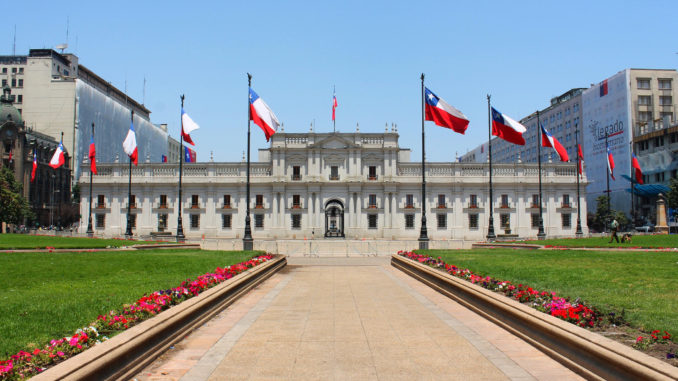
6.26.2019
Power Knot, the market leader in products that process waste food in commercial foodservice operations, has announced that the Government Palace of Chile has installed its Power Knot LFC biodigester.
El Palacio de la Moneda, located in Santiago, is the seat of the President of the Republic of Chile, and is essentially the equivalent of the United States’ White House. This is Power Knot’s first contract with a government agency in Chile and was managed through ENERGIA ON, Power Knot’s representative in Chile.
The decision by the staff at la Moneda to install an LFC-300 biodigester was driven by the government’s ongoing commitment to raise national awareness about how recycling at a local level can have national impact—and that the waste-reduction practices implemented by the nation’s most prominent public building should be adopted by public- and private-sector foodservice operations.
“Our principle objective is to reduce our negative impact on the environment, through many different and integrated actions, to help eliminate waste on our planet,” said Susana Soto, administrative department officer at La Moneda. “We hope to raise awareness about sustainable living by sending a clear message that today we must start working for the future so that our children and grandchildren have a tomorrow as promising as the one we inherited yesterday.”
Chile is on the brink of transition—from an emerging country to a developed country. It has been one of Latin America’s fastest-growing economies over the past decade and has emerged as an important test case in how best to forge links between the government, people, and businesses to drive sustainability initiatives that can be modeled in other Latin American countries.
Chile’s promotion of the United Nations Environmental Program’s education for sustainable consumption (ESC), which teaches citizens about the environmental impact of their consumer choices, represents the latest phase of a multilateral effort. Chile was selected as one of three countries to pilot an ESC project aimed at developing clear guidelines for national policymaking.
“Chile is in the vanguard of efforts to shape a new generation of green consumers in Latin America, where rising living standards are increasingly reproducing the consumption habits found in the developed world,” said Iain Milnes, president of Power Knot. “La Moneda is setting the right example by showing how the public and private sectors can reduce carbon emissions and eliminate the costs of transporting waste food to a landfill.”
Dozens of Power Knot LFC biodigesters are going online at government facilities around the world
- Canada’s Department of National Defence recently took delivery of several orders of Power Knot LFC biodigesters and SBT™ bin tippers.
- In Canberra, Australia, a Power Knot LFC biodigester will soon be eliminating waste food at Parliament House, whose kitchen caters not only to government employees but also to high-profile private events and functions.
- Here in the USA, dozens of Power Knot LFC biodigesters have been installed in military bases and correctional facilities since 2014.
The LFC biodigester is a practical alternative to the traditional disposal of waste food. It uses a series of processes in which microorganisms break down biodegradable material in the presence of oxygen. The LFC environment accelerates the digestion of most food products within 24 hours by using a proprietary mixture of microbes and enzymes. The output is grey water that is environmentally safe, and suitable for discharge down the drain or to enrich landscapes. Almost all waste food from an industrial kitchen, including fruits, vegetables, meat, fish, cheese, bread, rice, and noodles can go into the LFC biodigester, and the machine can compost both raw and cooked foods. The process is totally green because it uses no chemicals.
Government agencies are especially concerned about deriving key performance indicators of all sustainability initiatives. To support environmental sustainability reporting, all Power Knot LFC units can upload detailed performance data to the LFC Cloud. Sustainability managers can then view how much waste food has been processed by any machine or site, and gain insights into the reduction of carbon emissions to support wider reporting requirements.
About Power Knot
Power Knot LLC markets the LFC® biodigester and SBT™ bin tipper for use in commercial kitchens and foodservice operations that demand hygiene and durability. The LFC biodigester digests waste food and reduces the expense, inconvenience, mess, and carbon footprint of disposing of waste food that would otherwise be hauled to a landfill. With installations globally, Power Knot offers the most technologically advanced machines available today and is the market leader, offering seven biodigester models that process from 25 kg (50 lb) to 1200 kg (2600 lb) of waste food per day. Power Knot designs, develops, and manufactures its products in Silicon Valley, California.
Does your company have a technology solution selection or success story it would like to share with our readers? If so, we invite you to review our editorial guidelines and submit your press release for publishing consideration.

